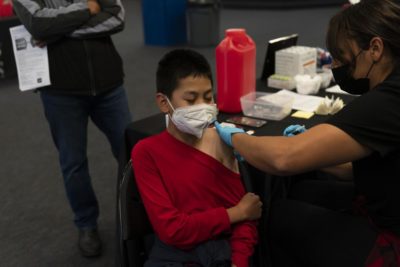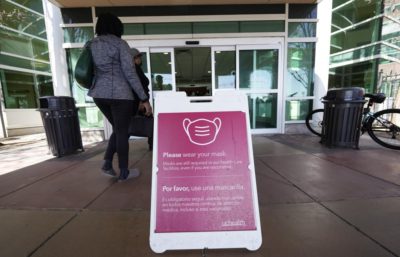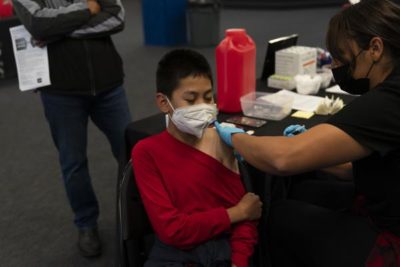
“We have reached a pivot point,” Becerra said in an interview with The Associated Press. “How well we pivot is on us.”
Omicron variant BA.2, which is causing a virus rebound in Europe and Asia, is gaining ground in the U.S., although overall cases here are still in decline. And Becerra said a funding impasse with Capitol Hill could hamper the Biden administration’ s promising new strategy called “Test to Treat.”
Under that plan, people could go to their local drugstore for a COVID test, and if they were positive, receive medication they could then take at home. A “one-stop shop,” he called it.
But “if you don’t have the dollars to let it fly, you’re stuck,” Becerra said. “You’re stuck on the ground.”
In a wide-ranging interview, Becerra also expressed concerns about cases rising among children as schools lift mask requirements.
Schools have become a flashpoint in the COVID response, with some parents objecting to mask requirements as an infringement on personal liberty and others reluctant to put their children near any potential risks. With the pendulum now swinging in the direction of unmasking, Becerra said he hoped the cautious will not be singled out.
“I would hope that there’s no stigmatization of a child,” he said. “If a parent says, ‘I want my child to wear a mask,’ good for them.”
He also said his Department of Health and Human Services is trying to prepare so millions of people do not lose health insurance if their eligibility for Medicaid lapses when the government ends the official COVID public health emergency. During the pandemic, Congress has been providing more money for state Medicaid programs. But in exchange, states have been precluded from culling the rolls.
A more comfortable new normal is within reach, Becerra said, but it depends on two things. One is the virus, which has proven hard to control. The other is Americans’ sense of personal responsibility. With less than half the eligible population now boosted, even as medical experts weigh a new, 4th round of shots, more appeals to personal responsibility may get tuned out.
Asked about the likelihood of a return to more relaxed and normal living, Becerra said, “If everyone does their part, then yes.”
But he quickly added, “If not, get ready. This thing is hard to tame. COVID has taken us on a wild ride.”
The White House and Congress are in a stand-off over President Joe Biden’s request for $22.5 billion to continue the government’s COVID response this year. House Speaker Nancy Pelosi tried for a $15.6 billion package, but varying objections from Democrats as well as Republicans have kept a deal from going through. The White House says money for some efforts, including the purchase of more booster doses and for monoclonal antibody treatments will run out by the end of this month. Also at risk: free COVID care for uninsured people.
As for the “Test to Treat” program, Becerra said it would help people get medication soon after they are infected, heading off potential hospitalization.
“Test to Treat is indispensable,” he said. “You go a long way in avoiding the spread of COVID.”
But right now the option is not widely available. Pharmacy “locations don’t grow on trees, the way money doesn’t grow on trees, and it costs money,” Becerra said.
Throughout the pandemic, the government has had problems trying to clearly communicate with the public about COVID risks and countermeasures. The Centers for Disease Control and Prevention, an HHS agency, has faced particular criticism as giving complicated, shifting guidance.
But Becerra said people who spread misinformation about the coronavirus must bear the brunt of the blame for Americans’ confusion.
“The scientists have communicated pretty clearly with the American people what to do,” he said. “Unfortunately, somebody else decides to slant or skew the message, or completely distort in ways that are untrue.”
Becerra likened the pandemic to a five-alarm fire that is being contained but is still dangerous.
“You need to have a sense that things have stabilized” before attempting to move on from COVID, he warned.
“We have to get to a point where we believe the health status of the country and of our people is sufficiently stabilized,” he said. “I think we’re getting closer and closer to that point where we see no need to have those five alarms.”






